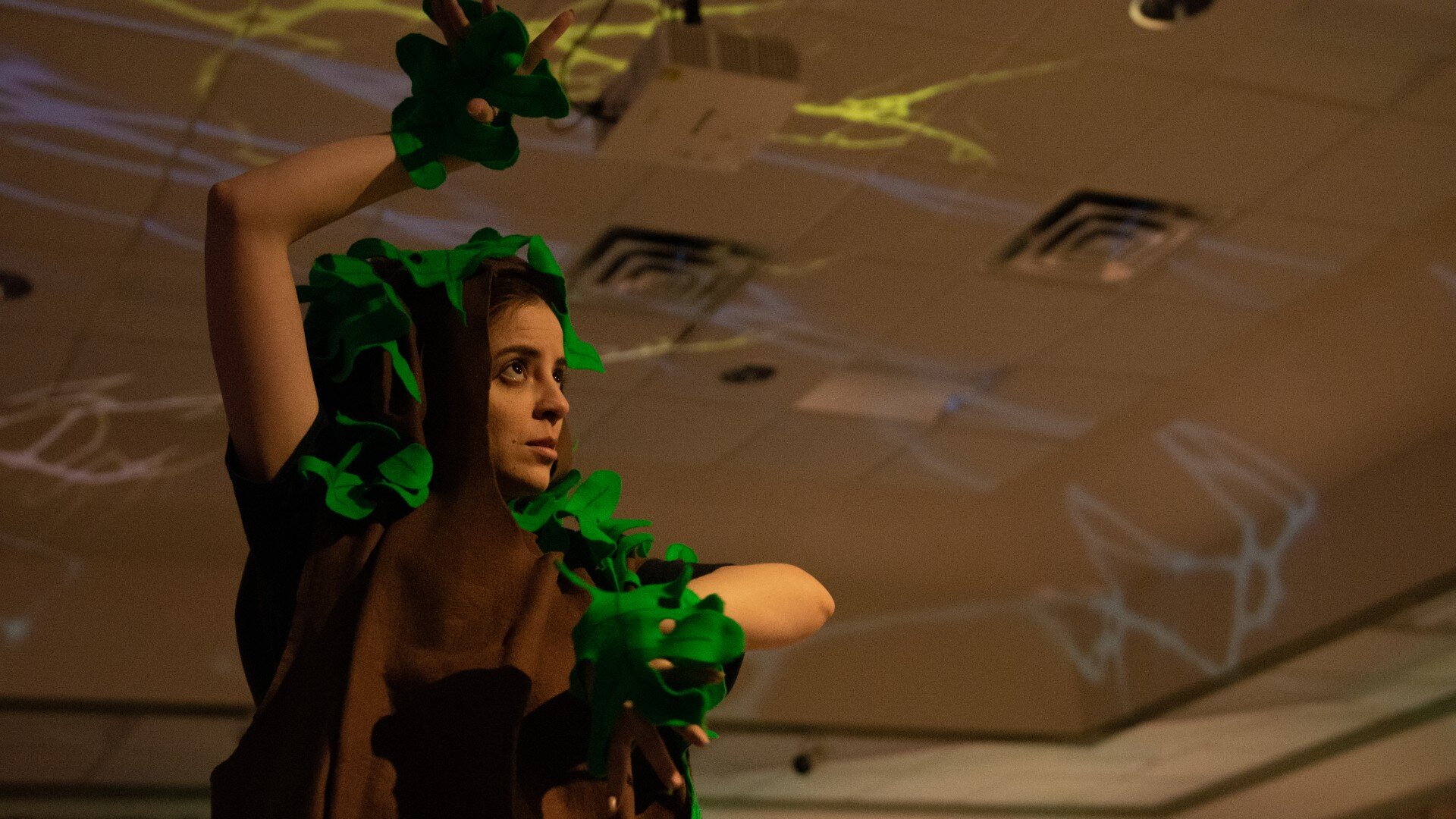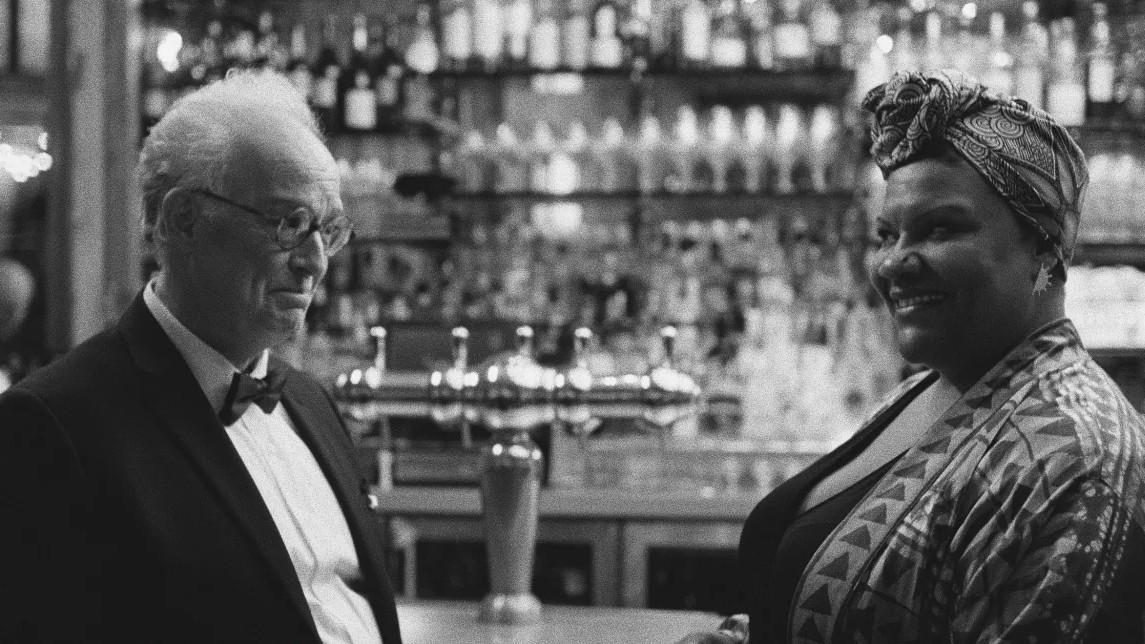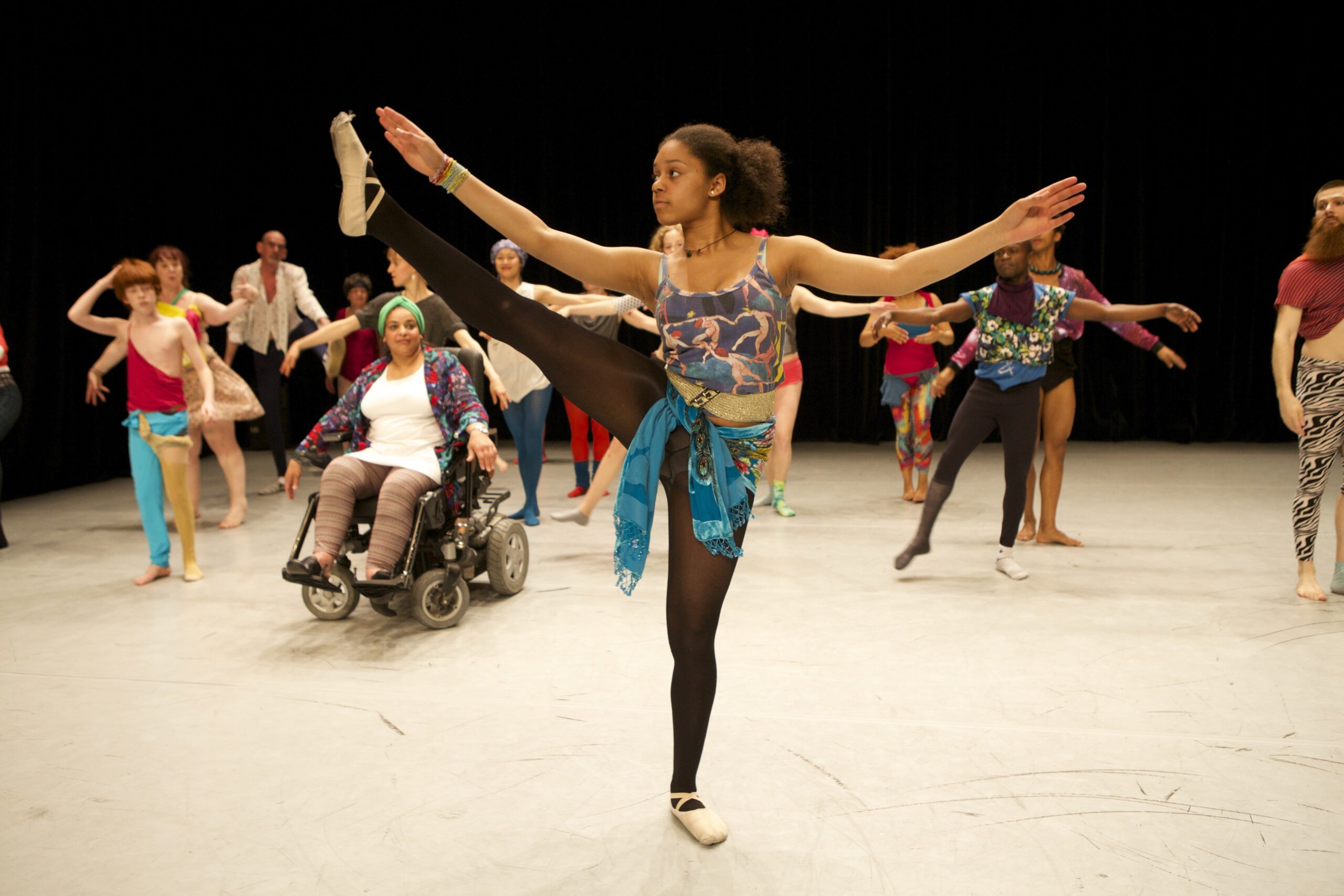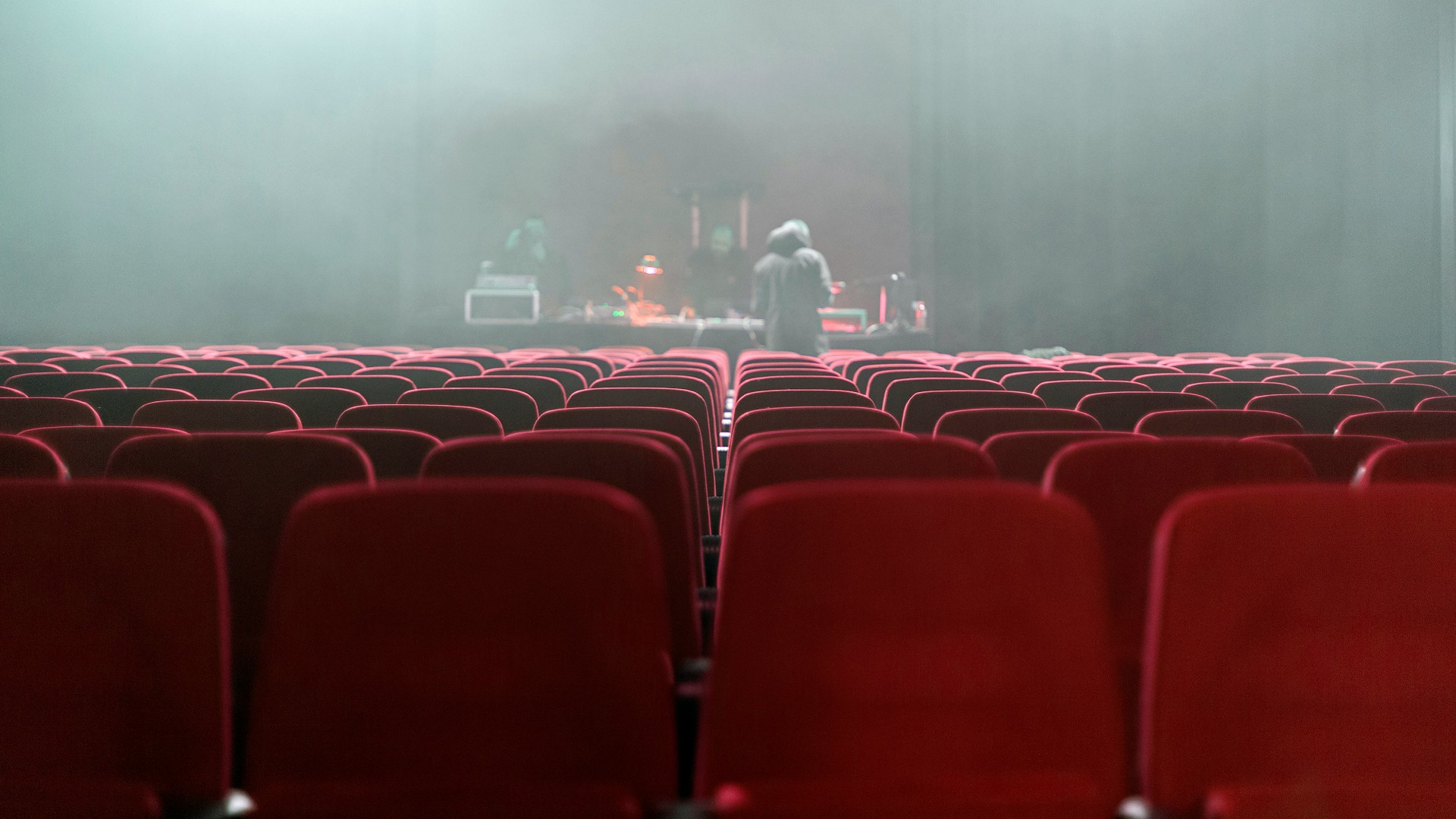Feel free to read or listen to this article.
DID YOU KNOW THERE IS A CLIMATE CRISIS HAPPENING?
Just kidding. You probably do already know that.
Maybe you thought my question was funny. Or, maybe you felt a horrible knot in your stomach. You may have even been offended that I assumed you didn’t know. These possible responses are a result of my dramaturgical choice to engage you. And in writing that question, I joined the many, many, many theater thinkers/practitioners increasingly trying to address the anthropogenic (human made) climate crisis—through our plays and our writing. Like them, I am trying to “do something“ about climate change, and that “something” means trying to grab your attention.
Writing that sentence or this essay is far from the first time I have tried to harness somebody’s attention to “do something” about our current environmental moment. About two years ago, I was working with my colleagues in Austin, TX to produce Chilean theater-maker Manuela Infante’s Estado Vegetal. It is a wonderful vegetative play about a tree that causes a power outage and causes an accident that leaves someone yes, in a vegetative state. While we were working on the play, a third consecutive once-in-a-lifetime winter event hit Austin, covering the City’s tree canopy with ice and causing, yes, power outages. The storm was dubbed “OakPocalypse” because of the amount of botanical debris left in its wake. Wanting to be intentional about where we presented the play, our production took place at the Zilker Botanical Garden, and later transferred to UT Austin. But because we were presenting it at a place that had so many trees –and these trees were downed by the once-in-a-lifetime event– we were shut out of the performance space for the entirety of tech week.
What I am hoping to illustrate here is that making Eco-Theater is really hard because it has the additional challenges imposed on us by the very thing we are responding to. Luckily, there are aspects of making Eco-Theater that can be easy if we are able to look at how other artists have done it. I would argue that making Eco-Theater in 2024 demands that we venture well-beyond the traditional play development models set by industry and taught in academia.
I have spent the last decade or so tackling the question of how to make Eco-Theater. Because of that, I have also been trying to figure out what, exactly, Theater can contribute to the climate crisis beyond capturing someone’s attention. To try and workshop some of my findings, in this series of essays I would like to share some ideas with Extended Play readers in the shape of dramaturgical questions. I use dramaturgy –and not playwriting, directing, devising or even performing– because, as argued by dramaturg Zoë Svendsen, we can use dramaturgy to see how theater structures the attention of an audience, and in that structuring, we can identify relations of power. For example, Svendsen argues that significant portion of modern theater (looking at you, Samuel Beckett), eschewed the fact that the audience was there or was necessary to constitute the work. By treating the audience as if they were not integral for the performance to take place, playwrights like Beckett uplift the artistic ideal that art can exist without an audience.
Like all good dramaturgs, I would like to offer some context and some probing questions before getting our hands in the dough. In the remainder of this essay I sketch out the dramaturgical context, if you will, for making Eco-Theater. I do so by inspecting some “factoids”, ideas that feel like the truth, that have “truthiness” to them, but are not in fact true.
Factoid #1: Artists are megaphones.
Somewhere between the worlds of academia, activism and theater, a powerful idea has taken root over the last 50 years: that artists might be useful as tools to raise awareness about environmental or political issues. There might be a play that comes to mind for you –one that tried to unashamedly hold your attention and tell you about this horrible thing. Or maybe the play illustrated it for you. This is what I call the “Artist as Megaphone” model of Eco-Theater. For example:
Worried about his carbon footprint, Guatemalan teenager Khristián decides to stop using plastic bottles. This makes his life harder, but he feels better because he’s making a difference by reducing his plastic waste. One day, the bottles come to life and take him on a journey where he realizes that plastic bottles are but a small part of the problem, leading him (and the audience) to try and get more people to join him in his effort to end plastic pollution for good.
With the aftertaste in your mouth of this fictional play, gentle reader, I introduce my first offering: the reason that the artist as megaphone model is not effective for Eco-Theater is that it lacks reflexivity about what it’s doing. Canadian theorist and playwright Jordan Tannahill, has a critical framework that he uses to describe when a play fails to grab our attention. He describes it as “lazy” (lacks a specific point of view), “safe” (underestimates audience’s capacity for complexity) and “irrelevant” (assumes its own relevance and indefinite timelessness, without asking whether it’s timely). Tannahill’s words are perhaps harsh. I did begin my essay recognizing how hard –not to mention expensive and exhausting– it is to make Eco-Theater. But I think he has a point that we can apply to Megaphone Eco-Plays: they adopt the point of view of an activist and forget their own shape as a work of theater they assume that an audience doesn’t have complicated feelings about plastic, and they assume that any time is a good time to hear about plastic pollution. So I am not calling any specific play/production those terms. Rather, I am critiquing the dramaturgical assumptions that underpin those processes as lazy, safe and irrelevant.
Megaphones have their uses, for sure. They were very helpful during Occupy Wall Street in Manhattan, the Indignados movement in Spain, and Tahrir Square in Egypt. But have you used one in a hospital? Or in your own home? How about to talk to someone from whom you’re also asking emotional openness, hours of their time and charging them $35-50?
It is perhaps the “safe” category that is most poignant when critiquing megaphone Eco-Theater. Megaphone Eco-Plays make an assumption about the person on whom you’re using them: that they know very little about the issue you’re addressing in your play. Have you ever felt more patronized than when someone approaches you to tell you about an issue you care deeply about assuming you don’t know anything about it? And, worse, when they information they give you is even just a little bit incorrect? Imagine how those on the frontlines about climate change feel when Eco-Theater tries to raise awareness about issues they’ve been concerned with for decades, sometimes centuries.
Factoid #2: The solution to pollution is information.
The urgency of Eco-Theater is well-founded in the idea that we are approaching –and have maybe even crossed– points of no return in the warming of the planet. In 2021, the UN Secretary General issued a “red alarm” for humanity that framed the latest Intergovernmental Panel on Climate Change (IPCC) report. Anxiety is a normal response to being told we are approaching the edge of a cliff and we have a pretty good guess of what lies below that edge. But how do we reckon with that anxiety in Eco-Theater?
The dramaturgical structures that carry information like the IPCC report produce a great deal of anxiety. ”Here are several models and facts,” they say. “All our data points towards an amorphous, partially visible threat, but you should be scared and you should do something about it. End of play. ”American environmental philosopher Timothy Morton calls this “an information dump” mode of address, and ascribes an authoritative quality to this. If an authority drops a number of bad facts on us, it might induce guilt, inspire defiance or plant gloom in you. (If you were mischievious as a child this mode of address might be familiar to you.)
There are copious examples in British climate change dramas about what this information mode does to its audiences and to its characters. It can make them anxious and hyper-obssessed (as it does to the Woman in Lungs, and George in If There Is I Haven’t Found It Yet), it can make us fearful/hopeful for the future (as it does for scientist Chris Rapley as he performs in 2071) inspire action (as it does for Will Paxton and Sarika Chatterjee in Resilience), resignation (as it does for Robin Paxton in On The Beach) or straight up denial (as it does for most of the characters in Earthquakes in London). I would venture guesses that this mode of address had similar effects on the audiences for these plays.
Eco-Theater should always anticipate the audience’s familiarity with the information dump mode of address, but not necessarily adopt it. Instead, –and here is my second offering– Eco-Theater’s unique contribution to addressing the environmental crisis is its ability to identify specific relations of power that are concurrent with environmental injustice. By relations of power I refer to a) the question of whose experiences and knowledge about climate or environmental injustice “count” and how do they count, b) what are the ways of thinking that underpin our extractive capitalist system which theater might be inadvertently repeating (extracting labor, giving shape without consent, creating hostile atmospheres), and c) what we think about and expect from Eco-Theater and the arts at large in this moment of crisis.
If Eco-Theater looks beyond scientific models as authoritative sources of knowledge and looks, for example, at Black communities affected by pollution in their neighborhood, such as in Lorraine Hansberry’s A Raisin in the Sun or Erika Dickerson-Dispenza’s cullud wattah, we can think about environmental crises differently. Rather than an unprecedented crisis that “we” are all worried about in the same ways, Eco-Theater can be a place to consider how they affect us differently and what we might be able to do from our unique vantage points. Rather than scientific tipping points, we might consider, as Potawatomi scholar Kyle Whyte has done, the “relational tipping points” that colonialism, extractivism, racism and many other -isms have strained. Because if, in the words of writer-activist Naomi Klein, “to change everything, we need everyone”, we have to tend to the quality of the relationships among everyone.
Factoid #3: “We” have no idea how to deal with the crisis.
My third offering is that by considering the constitution of power relationships concurrent with environmental injustice, Eco-Theater can help us understand aspects of environmental injustice that are under-explored, highly specific, and which can be re-constituted through performance. In other words, if environmental injustice is the result of specific relations of power –the subjugation of certain communities to extraction, the removal and re-location of other communities in accordance to designated boundaries, the lack of accountability for key economic players that can damage an environment but vanish legally, the lack of spaces to discuss the messiness of our situation–, theater is a place where we can reconfigure the world, many worlds, and experience what arises from that reconfiguration.
An example: for many indigenous communities, it might already be too late for climate justice. As Potawatomi Indigenous botanist Robin Wall Kimmerer argues when discussing the displacement of Indigenous peoples as climate refugees: “Once again, we are in a situation of forced climate change adaptation.” Cherokee playwright/performer DeLanna Studi captures this perspective wonderfully in her performance And So We Walked, and the Canadian/First Nations/immigrant cross-cultural trio of Darrell Dennis, Daniel Arnold and Medina Hahn navigate the ethics of choosing, literally, what to do in the wake of displacement in the choose-your-own-adventure play Inheritance.
Another example is the predicament of young people with relationship to the climate crisis. Activists like Greta Thunberg are often poised as changemakers and people who drive the needle for climate action, without taking into account that by glorifying their work or displacing responsibility on to them we are letting them take responsibility for a crisis that is not of their making. Plays like Dawn King’s The Trials or Jordan Tannahill’s Is My Microphone On?, or many of the works by Mammalian Diving Reflex let young people have a dramaturgical voice where they can enact the power that adults deny them in the face of climate crisis: the power to hold adults accountable for their actions.
Re-Composing Environmental Injustice
From these three phenomena–countering the idea of an artist as megaphone, that the solution to pollution is information, and that “we” have no idea how to deal with the crisis–we can then ask what are the plays or play-making processes that move beyond those? I am so glad you asked! That is exactly what this series will be covering. The artists and processes I write about make Eco-Theater in a way that treat their play development processes as research. They make investigative theater and the knowledge that these investigations yield is not only captured in the scripts or the performances, but also in the renewed understanding that the artists then possess about the climate crisis and other environmental issues.
My final offering as a way to open this series is rooted in the idea, as argued by Chilean playwright/director Manuela Infante and Dutch dramaturg/scholar Maaike Bleeker, that theater thinks.It thinks in its recompositions of the world, perhaps in the way that a forest thinks.
And so, if theater thinks, it can rethink the assumption that underpins mainstream white environmentalism. How? Come back in a few weeks for the next installment of this series.
Wait, Before you go: Who Are you?
So glad you asked! I’m a multihyphenate–playwright, director, researcher, educator, producer. I spent a few years with my head deep in the world of environmental diplomacy–managed to get an internship and a job offer at the UN!–but left because that world lacked the reflexivity and collaboration I have learned to relish in good theater collaboration. I also came to the theater because I had a hunch, that through theater I could figure out the answer to these questions, which I now offer to you. To me, research in theater is the process by which we investigate how the intensely personal dynamics that we see onstage between characters and their surroundings are reverberation of broader political processes. Specifically, I believe that when as artists/researchers we attend to a play development process without an answer that we want to convince the audience of, we can harness their attention and ours towards what has been ignored so far. We can offer connections, perspectives, and experiences that stimulate their entire selves, for them and us to continue making our own meaning. Isn’t that better than asking someone whether they know climate change is happening?
Extended Play is a project of The Civilians. To learn more about The Civilians and to access exclusive discounts to shows, visit us and join our email list at TheCivilians.org.
Author
-
Khristián Méndez Aguirre (he/él) is an artist/scholar working at the intersection of Latino performance and environmental justice.









